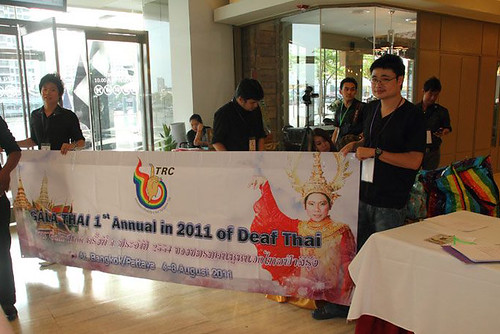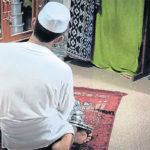Chaiwat Limprasertying, 33, knew he was gay when he was 12 years old, when he found himself different from others. But he is used to being different. He was born deaf. He couldn’t tell anybody about being gay at that time. “It was like being doubly disabled, and I was embarrassed to tell others about my gender identity.”
Fortunately, he changed his mind after he came to know a friend who is openly gay-deaf. Chaiwat was 20 years old then. “I realized I’m not different from others thanks to him,” he said. “Now, I don’t feel any difference between me and others. The only difference is that I use my hands to communicate with others.”

Chaiwat Limprasertying at Deaf Gala Thai 2011
Photo Credit: DTRC (Deaf Thailand Rainbow Club) [2]
Even though Chaiwat was able to reveal his identity later in life, many LGBT disabled people are still struggling between themselves and what their society asks them to be. Paradoxically, they tend to be considered merely as ‘disabled people’. Society normally doesn’t even think whether they’re gay or not.
“Disabled people are considered as if they don’t have gender,” said Saichon Kloyiam, an expert social worker for the disabled currently working at the Collective Leadership for Equity in Health Project. “Gender identity is a hidden issue in this field, and disabled people normally hesitate to disclose their gender identities.”
‘A HIDDEN ISSUE’
Thai society still doesn’t care much about this hidden issue, although the public has started accepting disabled people and it’s now changing into a so-called barrier-free society. The public may not consider the gender identity of the disabled as a problem, and even worse the disabled tend not to open their mouths for fear of being condemned.
Kloyiam said that Thai society particularly doesn’t accept things that are not standard, so it blocks the disabled from opening up about their sexuality.
“I’ve been working in this field for long, but I still didn’t focus on this aspect,” said Kloyiam. “We will never know if they don’t tell us what they have inside. That’s why making a society where it is easy for people to reveal their hidden personalities is now quite important.”
WHAT’S INSIDE?
Although Chaiwat was able to come out bravely, it doesn’t mean everyone can be as strong as he was. Society isn’t yet ready to think about the gender identity of people with disability, while they are accepting of LGBT people and disabled people separately. People don’t expect the two to come together.
This is obvious from Chaiwat’s experience. Chaiwat himself was able to come out to his friends, but still can’t tell his parents he’s in fact gay.
“I can’t,” said Chaiwat. “I don’t want to disappoint them anymore. But they may realize it one day themselves, because whenever my parents ask me why I don’t get married, I can only say I don’t want to. It’s totally weird for them.”
DIFFERENT AND THE SAME
What Kloyiam said is true now: Conservative thinking keeps people’s mouths shut. But does this hidden issue affect only the LGBT disabled?
Looking carefully, what’s inside Chaiwat is probably same as non-disabled LGBT people. That’s one of the reasons why he says he isn’t different from others. What makes the difference is a society that tends to classify people as normal or abnormal.
“I can say the biggest issue that the LGBT disabled have here is that they can’t come out to those who still discriminate against anything unusual; I mean they are old-fashioned. And this is exactly what non-disabled gay people need to figure out too,” said Chaiwat.
A FIRST STEP
Even so, it’s still true that disabled people have more handicaps than non-disabled people when they are LGBT. Some of them have no chance to get advice about their lives. Chaiwat said that this is because there are few opportunities for them to do so.
Two years ago in August, Chaiwat, as founder of an organization called DTRC, the Deaf Thai Rainbow Club, organized a progressive event for LGBT deaf people in Thailand. This event was called Deaf Thai Gala 2011, and aimed to allow LGBT-deaf people to exchange ideas and to prevent HIV. It was the first and biggest event ever to happen in Thailand for LGBT deaf people.
It was actually inspired by an event held in Hong Kong in 2009, also for LGBT-deaf people, and many foreign participants enjoyed sharing their experience.
“This kind of event can really help people who can’t disclose their identities,” Chaiwat commented. “They may recognize they’re not alone and can be motivated by others who have already come out, as I did.”

Deaf Gala Thai 2011
Credit: DTRC (Deaf Thailand Rainbow Club) [2]
TO THE BRIGHT FUTURE
Thanks to this kind of grass-root effort, ‘old-fashioned’ people also start gradually changing their minds because the LGBT disabled have a certain entry to a better society now.
“Our situation is still not good,” Chaiwat said. “Many LGBT disabled are still troubled by their ‘doubly disabled’ situation, but at least our lives are getting much better than before.”
“I want the same rights that others can enjoy. Thai society should now accept diversity and treat all people equally. It takes a long time, but it will certainly come one day if we keep moving.”
In Nakhon Pathom, Chaiwat runs his own business. He now has a partner who’s non-disabled, and they have been in a relationship for nine years. “He’s not disabled, but he accepts my disability,” said Chaiwat. “For me, it really took a long time to find someone who could understand me so that we can be together.”
Takato Mitsunaga is a freelance journalist in Thailand
Links:
[1] http://www.prachatai.com/english/sites/default/files/intro_picture/9877519816_a50afa6691.jpg
[2] https://www.facebook.com/deafthairainbowclub.dtrc
[3] http://www.prachatai.com/english/category/chaiwat-limprasertying
[4] http://www.prachatai.com/english/category/deaf-thailand-rainbow-clubdtrc
[5] http://www.prachatai.com/english/category/disability
[6] http://www.prachatai.com/english/category/gays
[7] http://www.prachatai.com/english/category/takato-mitsunaga
[8] http://www.prachatai.com/english/category/article
















